Chevaliers against roundheads. English Civil War
prehistory
The English revolution of the XVII century was of great importance not only for England, but also for the whole world. England opened the way to the capitalist development of the whole world. In the kingdom, the elites finally changed: bourgeois property and values defeated the feudal system. True, the remnants of the old system remained, for example, in the form of a constitutional monarchy.
The "perestroika" of England was a long time ago. The revolution and the Civil War only completed a long process. Even during the War of the Scarlet and White Roses in the XV century, most of the feudal aristocracy was cut out. The trading class has seriously strengthened its position. This war actually drew a line under the English Middle Ages. By the beginning of the revolution, capitalist relations had already penetrated deep into agriculture. From the 15th century, the process of “enclosing” was going on, which eventually led to the elimination of the old English peasantry. At the same time there was a process of formation of capitalist farming. The feudal lords gradually turned into a bourgeois - “new nobility”. The developing industry demanded thousands and thousands of practically disenfranchised workers, essentially slaves. Foreign trade developed rapidly, English capital penetrated everywhere. The foundations of the British colonial empire connected with the interests of the big bourgeoisie and the highest nobility are being laid.
However, in order for the new capitalist regime to finally take up, it was necessary to eliminate a number of feudal principles, including a strong royal power. The bourgeoisie needed a ruling parliamentary system, where, in view of property qualifications, all power belonged to the rich. At the same time they did not want to destroy the monarchy itself, it only needed to be limited. And in order to crush the old order, the popular masses were used as usual - citizens and peasants. As an ideology, revolutionaries used Calvinism in the form of puritanism. The Puritans represented an organized, disciplined mass party, which expressed the interests of the bourgeoisie, the new nobility, and the prosperous peasantry. The military discipline of the new English army was based on the Puritan ideology.
In the first decades of the XVII century. in England, implicitly went the process of development of a revolutionary situation. The “English boat” was swinging. There was a struggle of "swamp people", peasants against enclosures, urban poverty rebelled. At the same time there was a split among the British elite, where the bourgeoisie and the new nobility wanted transformations and restrictions of the monarchy and the church. This led to the intensification of the bourgeois parliamentary opposition, which criticized the financial, foreign and church policies of the royal government.
The bourgeoisie was particularly annoyed by the government’s lack of judgment in monetary matters. The Protestants knew how to save, and were annoyed by the exorbitant expenses of the royal court. In a petition from 1628, the parliamentary opposition demanded: 1) not to force the population to borrow and pay taxes that the parliament did not approve; 2) do not arrest or confiscate property without a court sentence based on laws; 3) to end the arrest of civilians on the basis of martial law; 4) to stop the army stands in the homes of ordinary people. That is, the main requirements were associated with the wallet.
However, an active foreign policy, requiring large expenditures, the need to build a large fleetThe creation of a permanent, regular army, as well as the luxurious life of the royal court, required large expenses. Large funds were sought by increasing various taxes. The tax policy of the government has caused discontent among the general population. In particular, people were unhappy that the king restored the old taxation, the so-called “ship money”. Carl twice dissolved the parliament, which did not want to approve taxes and autocratically collected taxes.
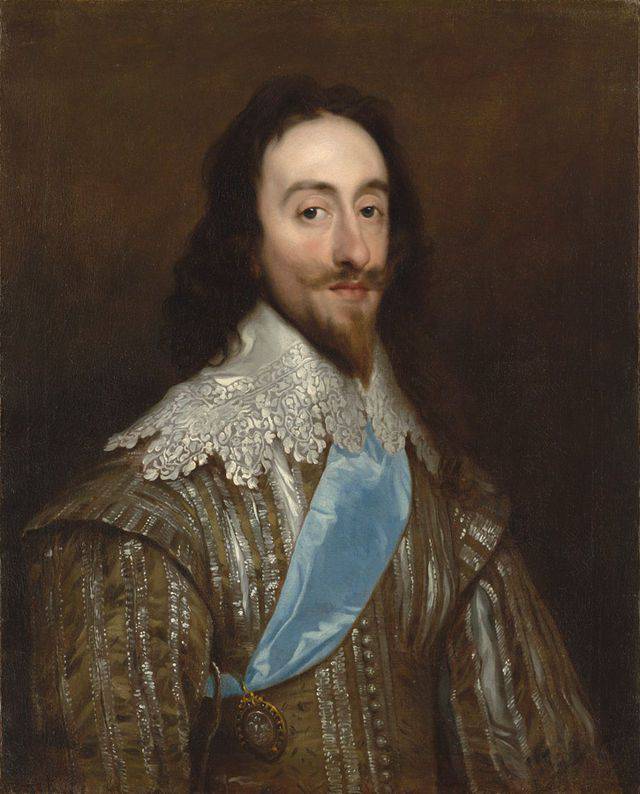
Carl First, portrait of Daniel Maitens
The beginning of the Civil War
The uprising in Scotland of 1637-1638, caused by the religious policies of the royal government, and the war that followed it, became the reason for the internal war in England itself. In 1639, the Scottish army moved to London. King Charles I (who reigned from 1635 of the year) was unable to gather an army and repulse the Scots. The English king was forced to give a promise not to interfere in the religious affairs of Scotland, and also to pay its military expenses. In fact, it was a tribute. The authority of the royal power fell heavily. The personality of Karl played a certain role in this, it was a weak monarch, who first overestimated his power, actively conducting tax and religious events, and then started a war and refused to make concessions, agree with "moderate" revolutionaries, although the likelihood of a deal was very high .
The conflict with the Scots caused a political crisis. Charles I called a parliament in 1640 to raise money. It received the name of the Long Parliament, as it was 12 years old. This time the parliament was determined and decided to limit royal power. Parliament became the organizing center of the opposition - the bourgeoisie and the new nobility. Parliamentarians introduced a law that obliged to convene a parliament every three years and deprived the monarch of the right to dissolve parliament. The parliament also passed a series of laws that did not allow Karl to raise taxes on his own and created a police force that was not under the control of the king.
To further exacerbate the political situation in England, the uprising that began in Ireland in 1641, where Karl collected money from the Catholics, promising them privileges, but did not fulfill the promises. In January, 1642, Charles ordered the arrest of opposition leaders. However, they managed to escape. Parliament, in response, decided to form its troops. Karl fled from London to York. 23 August 1642, the king raised the royal banner in Nottingham, under the guise of suppressing the "revolt of Count Essex", who commanded the parliamentary army, than formally declared war. Royalists began to join the king. By the end of September, the royal army numbered about 7 thousand soldiers (5 thousand infantry and 2 thousand cavalry).
The supporters of the king were called “Cavaliers” (English Cavalier). They wore long hair and white caftans. Supporters of parliament were called "roundheads" (English roundheads). The name came from a short haircut. In addition, round-headed wore red uniforms. Many Puritans also called themselves "people of the spirit" and "God of warriors."
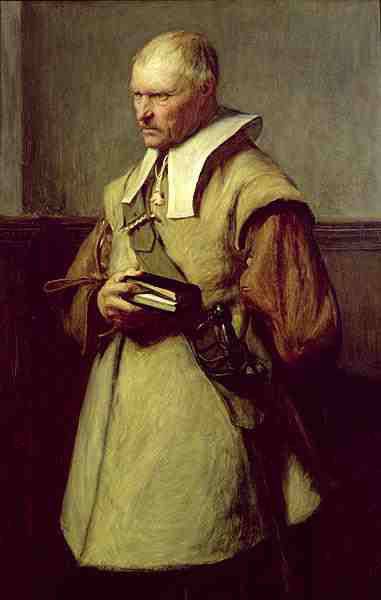
Portrait of a roundhead. John petty
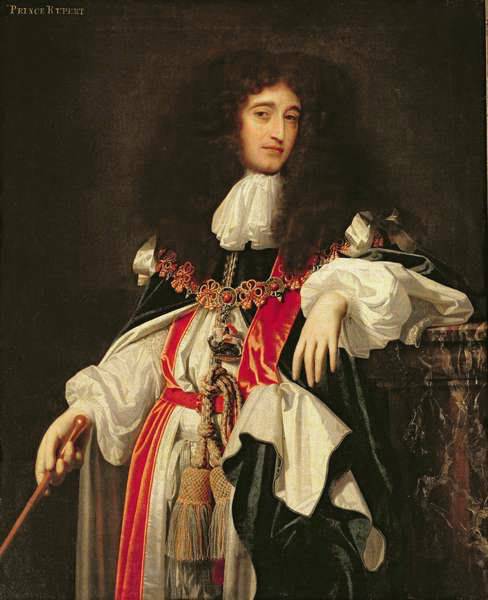
Commander of the Royal Cavalry Rupert (Ruprecht) Palatinate, Duke of Cumberland
Forces of the parties. "Iron-sided" and the creation of the Army of the new sample
The beginning of the war was interesting because both sides did not have serious troops - England traditionally did not have an army, it was recruited during the war. The feudal militia was the only force. But, in the hands of the parliament was the capital, where there were about 18 thousand police officers. The king settled at Oxford, and at the beginning had only a few hundred cavalrymen on hand. The parliament did not use a great superiority in forces and did not crush the enemy, giving the king time to create a small army. Perhaps, many still hoped that everything would cost and come to an agreement.
It should be noted that the territorial delimitation of the parties was one of the prerequisites for the defeat of the royalists. Under the control of parliament was the rich south-east of the country, including the capital London, a number of large industrial centers in the north, most of the seaports and the entire fleet. Therefore, the parliament had an industrial base developed at that time, which allowed equipping the army with everything necessary. The bourgeoisie and the new nobility had money. Under the control of the royalists were less economically developed northern and western territories of the Kingdom of England. The lack of a fleet did not allow the king to receive possible reinforcements and artillery from continental Europe. As a result, the king had a small resource base, little money and weak artillery, he did not have ships.
The royalists were able to form a small army under the general command of Lindsay, whose effective core was the noble cavalry (cavaliers), the infantry was weak. The nobles were well armed and experienced in military affairs. A single goal and contempt for the "lower" classes rallied cavaliers, the royal cavalry was a relatively disciplined and strong fighting unit. He was headed by a talented commander - the king's nephew, Prince Rupert (Rupert Palatinate), who, despite his youth (he was 23), he already had a great fighting experience, fighting on the side of the Dutch rebels against Spain, and participating in the Thirty Years War. However, the royal cavalry had scarce sources of human reserves and therefore could not fight for a long time, to bear heavy losses. And the king had no good infantry. The only hope was for quick success, the defeat of the London "shopkeepers".
In March, 1642, the parliament issued an ordinance, according to which the lieutenant lords of the counties should be given the task of gathering people fit for military service. 4 July was established the Committee of Defense, which led the military activities of Parliament. On July 6, parliament decided to form an army, Earl of Essex became its commander-in-chief. Parliament, which had large material resources and human resources, formed three armies: the main army was in London, the army commanded by Ferfax in the north and the army commanded by Waller in the west.
The parliamentary army had numerical superiority over the royalists. The base of the parliamentary army was the English peasantry (yeomen). From the peasants, especially with good training and management, we got suitable, stable infantry. Later, they also created the cavalry. Unlike the king, the parliament had almost unlimited reserves of people, as well as enough money, all the possibilities for creating an artillery park, supplying the army and financing military operations. Parliament was subordinated to the fleet, which isolated the king from Europe.
However, at the beginning of the war, the situation with military affairs in parliament was unsatisfactory. During the first stage of the war, the parliamentary army consisted of two disparate parts — mercenaries and militia of the counties. The militias were poorly armed, poorly supplied and had no combat experience. In addition, the territorial militias reluctantly fought away from their homelands. The police defended their lands fairly well, but reluctantly left it, especially for a long time. As the distance from their native lands increased, the combat capability of the police fell. Therefore, it happened that the militia did not show perseverance in the battle and at the first pressure of the royal cavalry tried to retreat. Somewhat better things were with the London police, which was staffed from the townspeople. The London police were better equipped. There were few experienced mercenaries hired by large landowners. The main weakness of the parliamentary army was the lack of efficient cavalry. It is also worth noting the problem of officers. The troops were headed by nobles, and many of them were not eager to fight against their king. Even after the success, the detachments of the parliamentary army did not bring the matter to a complete rout of the enemy.
The turning point occurred when the parliament decided to form a new army consisting of professional soldiers (the so-called Army of the new type). 9 December 1644 Oliver Cromwell delivered a keynote speech on the military issue in parliament. "To tell you the truth," said Cromwell, "I think that if the army is not transformed and if the war is not waged energetically, then the people will no longer bear the burden of war and force you to make a shameful world."
19 December 1644 issued a “self-denial bill”, in which all members of the House of Lords and the House of Commons were to give up command posts in the army. This was supposed to approve the unity of command in the army. The commander in chief was General Thomas Fairfax, and his deputy (lieutenant general) Cromwell, who commanded the cavalry. For the sake of Cromwell made an exception, he was under the law could not command, but the general respect of officers and soldiers did their job. The new army consisted of 22 Thousands of soldiers in the 23 regiments (12 infantry regiments, 1 dragoon regiments, 10 cavalry regiments).
Oliver Cromwell (1599-1658) played a leading role in transforming the parliamentary army. He was a middle-aged nobleman, received a strict Puritan upbringing, and hated Catholic papists. For some time he studied at Cambridge University, read a lot, studied law, general and military history. In his youth, Cromwell stood out with iron health, firm and purposeful character, was a brave and determined man. Cromwell was fond of swimming, archery, fencing, as well as hunting and horse riding. Cromwell was a great rider and a horse connoisseur, which helped him become an excellent cavalry commander. During the Thirty Years War, Oliver Cromwell followed the course of military operations and new developments in military affairs. He also studied military affairs under the leadership of a Dutch officer, familiarizing himself with the activities of the Dutch commander and the outstanding organizer of the new tactical school in the early seventeenth century, Moritz of Orange.
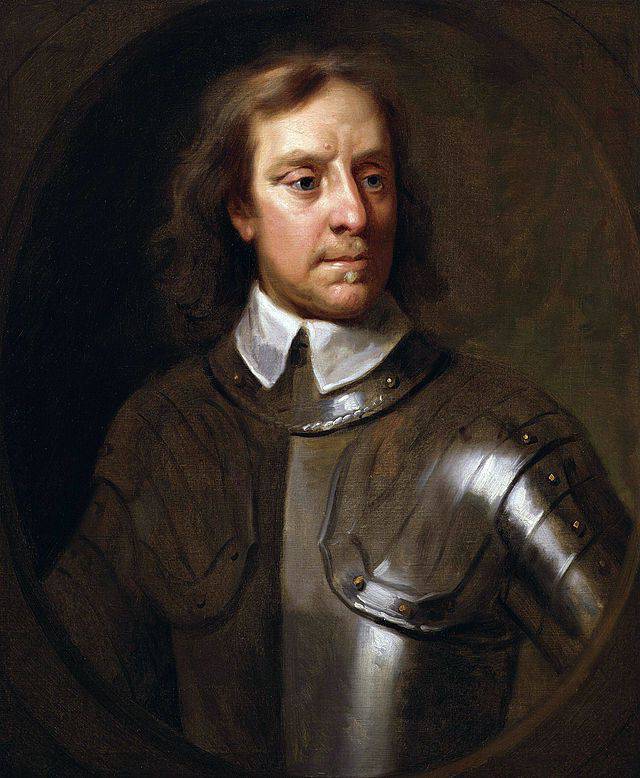
Oliver cromwell
Cromwell began to fight late, he was already in 40 years. However, he quickly transformed the theory into practice and became the best commander of parliament. At the beginning of the war, Cromwell formed a squad of sixty horsemen, becoming his captain. In 1643, Cromwell already had a regiment in 14 squadrons (more than 1 thousand sabers). Soon his regiment received the honorary nickname of "iron-sided". He was distinguished by iron discipline and stamina. “Iron-sided” were puritans (they resembled Russian Old Believers) with a strong religious core, did not drink alcohol, did not play gambling. Sparing no time, seeking money and personnel, and introducing several tactics, Cromwell eventually created an efficient cavalry. As a result, "iron-sided" served as a model for the Army of the new sample, becoming its core.
Cromwell paid great attention to personnel. The army, in his opinion, should not consist of “rascals, drunkards and all kinds of social scum”. The troops need to recruit "God-fearing people and worthy citizens who are ready to sacrifice everything for the freedom of the motherland," "people of God," "people of the spirit," "honest people," ready to "faithfully", serve the "cause," up to complete victory over the enemy. " Cromwell also democratized the officer cadres of the parliamentary army, with the main focus being on human abilities, not origin (in the future Napoleon will act in the same vein).
Cromwell was a demanding commander. In the army there was unity of command. “When I order,” Cromwell said, “everyone obeys or immediately dismisses.” I do not tolerate objections from anyone else. ” In the military regulations of the new army it was written: "Anyone who left his banner or fled from the battlefield is punished with death ... If the sentinel or watchman is found sleeping or drunk ... they will be mercilessly punished with death ... Theft or robbery is punishable by death."
Discipline was iron, which favorably distinguished his troops from the feudal cavalry and mercenaries. The behavior of the soldiers was strictly regulated. Strictly punished for drunkenness, debauchery, theft and looting, which were widespread in the mercenary armies of the time. In this case, the commanders always showed concern for the good material support of the soldiers. Puritan preachers were in the shelves where they carried out propaganda work. All this had a good economic basis: the soldiers received a large salary, many had their own horses. High morale, discipline and good training made Cromwell's troops a unified fighting body. As a result, the “new model” allowed parliament to win the war.
War
Parliament did not dare to wage war with all possible energy, to mobilize society to fight the royalists. The chief commander of the parliamentary army, Earl Essex, tried to avoid clashes with the royalists, hoping that peace would be achieved through negotiations. As a result, the army acted hesitantly, slowly, giving the strategic initiative to the enemy.
9 September 1642 20-th. the army marched from London to the north. Essex was in no hurry and stopped in Northsempton. Meanwhile, the royalists decided to go to London. Essex had to hastily go to meet the enemy, while on the march artillery lagged behind, there were many stragglers and deserters. October 23 at Edge Hill army clashed, in each detachment was about 14 thousand people. The battle revealed no winners.
The left flank of Prince Rupert overturned the right flank of the parliamentary army, but became interested in pursuing the runners and plundering the carts, leaving the active phase of the battle. Left-wing parliamentary cavalry successfully attacked the right flank of the royal army, and the infantry - the center of King Charles. Both sides suffered heavy losses, and only the returning Rupert's cavalry saved the royal infantry. The onset of darkness stopped the fight. October 24 parliamentary army received reinforcements, but began to develop the offensive. Essex ordered a retreat, which badly affected the morale of the army.
The royalists decided that victory was theirs. The king again decided to go to London. Essex barred his way at Turnham Green, having a double advantage in strength. Cavaliers did not dare to attack and retreated to Oxford. The parliamentary army let the enemy go.
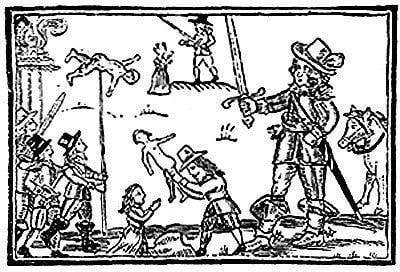
The atrocities of gentlemen. Engraving from pamphlet 1644
In the 1643 campaign of the year, the main forces of parliament have been inactive for a long time. Cromwell cavalrymen and other troops achieved a number of successes, but they had a local character. In the summer, the Essex army moved to Oxford, which had weak fortifications and was not prepared for defense. However, the army acted slowly, indecisively, many soldiers deserted. After several minor defeats of the advanced units, the commander led the troops back.
This worsened the strategic situation for the roundheads. The western army of General Waller, without receiving assistance, was defeated. Prince Rupert took Bristol, the second most important port of England. Then the large port of Exeter was lost. Base fleet narrowed. In the north, round-headed commanders under the command of Fairfax were also defeated and hid in Gull. Cavaliers had the opportunity to make a campaign against London: shackling Rupert’s cavalry with the Essex army in the center, and advancing in two groups - from the north and west. However, they also showed indecision, fearing for the rear, as in the hands of the round-headed there were important fortresses Hull, Gloucester and Plymouth.
In September 1643, the Gloucester garrison was in danger of falling. The army of Essex unlocked the fortress. But the royalists blocked Newbery’s path. September 20 hosted the battle of Newbury. Roundheads upholstered all the attacks of the royal cavalry and retreated to the capital.
The protracted war led to the emergence of new problems in the country. In England, a third force was formed - "Klobmen" ("dubinschiki"). These were peasant self-defense detachments that protected families and property from various lawless acts, all burglars and marauders. Their numbers reached 50 thousand people. The detachments of "dubinschiki" forged part of the forces of the king.
Map Source: World History. Encyclopedia. Tom 5. M., 1958
To be continued ...
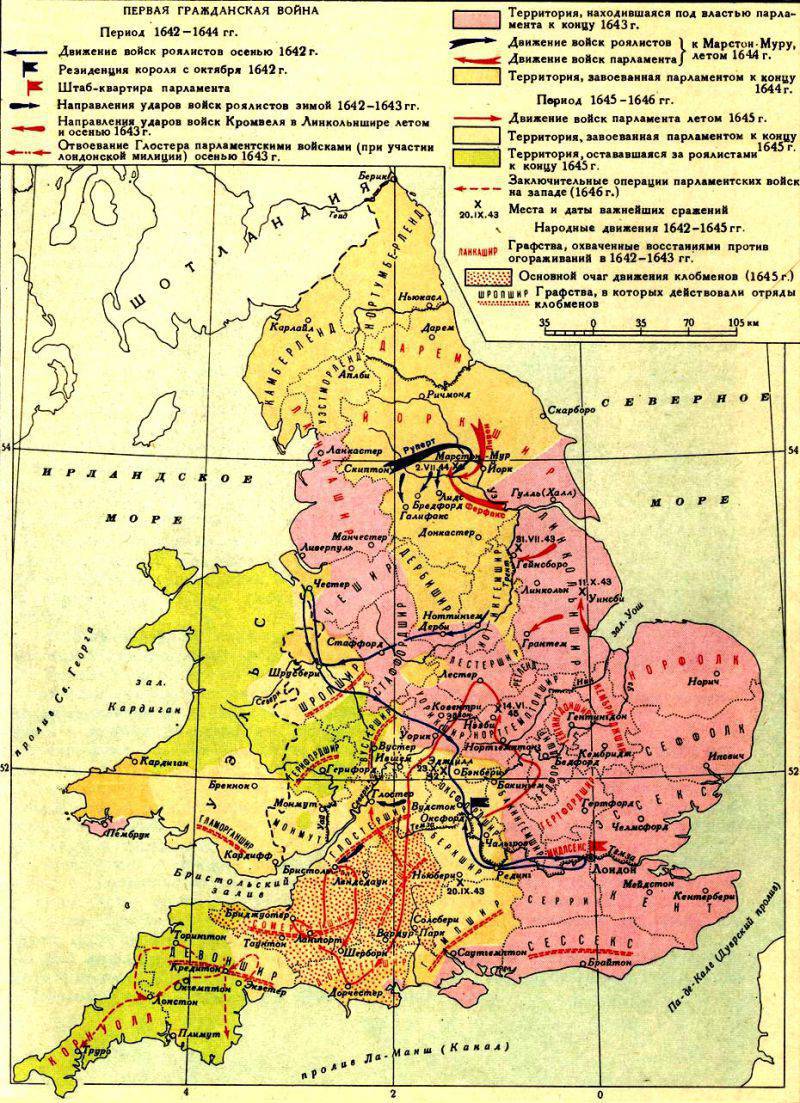
Information